Conjunctions
The word which joins two parts of a sentence is called a conjunction.
It is one of the important parts of speech. It joins two or more sentences, phrases and independent clauses.
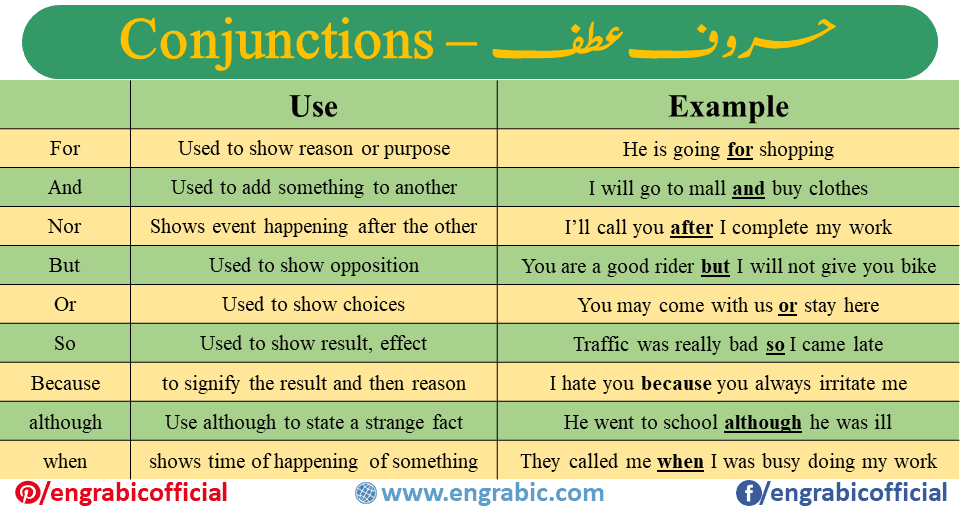
Types of Conjunctions
There are three types of conjunctions
- Coordinating Conjunctions
- Subordinating Conjunctions
- Correlative Conjunctions
Coordinating Conjunctions
Coordinating Conjunctions are used to join short sentences converting them into fuller lines. There are seven Coordinating Conjunctions and all of them are very easy to remember if you just keep in mind the acronym “FANBOYS”
| For | Used to show reason or purpose |
| And | Used to add something to another |
| Nor | Used to give an alternative negative idea to already given negative idea |
| But | Used to show opposition |
| Or | Used to show choices |
| Yet | Used to show contrasting idea that follows the preceding idea logically |
| So | Used to show result, effect or consequences |
Subordinating Conjunctions
It always introduces a dependent clause and connects it with an independent clause. In contrast to coordinating conjunctions, subordinating conjunctions can come first in the sentence because of the nature of relationship between dependent and independent clause. Below is a table listed giving you the examples of Subordinating Conjunctions.
| Because | While | As |
| Although | Until | Since |
| When | After | That |
| Unless | Before | As if |
| Whether | once | In order that |
Correlative Conjunctions
They come in pair and relate one sentence to another with suitable conjunction. Correlative conjunctions connect two equal grammatical terms. So, if a noun follows “both,” then a noun should also follow “and.”
| Either…..or |
| Both……and |
| Neither…….nor |
| Not only…….but also |
| Whether……or |
Use of Conjunctions in Sentences with Rules
| AND |
| Use and to join similar ideas |
| I will go |
| Use and to show that one action depends on another |
| They did not study and failed the exams |
| Use and to show that one action follows the other |
| I will go to mall and buy clothes |
| BUT |
| Use but to join two opposite ideas |
| You are a good rider but I will not give you bike |
| Use but to cancel the meaning of an idea |
| I like you but you irritate me a lot |

| OR |
| Use or to show choice |
| You may come with us or stay here |
| Use or to give some reason for something |
| Study hard or you will have to leave the college |
| SO |
| Use so to signify reason and then result |
| Traffic was really bad so I came late |
| Use so to tell something more |
| He was angry so he left early |

| YET |
| Use yet to signify a strange fact |
| He misbehaved with me, yet he as my friend |
| BECAUSE |
| Use because to signify the result and then reason |
| I hate you because you always irritate me |
| ALTHOUGH |
| Use although to state a strange fact |
| He went to school although he was ill |

| WHEN |
| Use when to show time of happening of something |
| They called me when I was busy doing my work |
| UNLESS |
| Use unless to signify a condition |
| You cannot enter the class unless you wear the mask |
| WHETHER |
| Use whether to signify if |
| I don’t know whether I should help you or ignore you |

| WHILE |
| Use while to signify two things happening at the same time |
| He ate food while I watched movie |
| UNTIL |
| Use until to signify a condition |
| I can’t allow you to sit in class until you wear mask |
| AFTER |
| Use to show on event happening after the other |
| I’ll call you after I complete my work |

| BEFORE |
| Use to show on event happening before the other |
| You should call me before leaving |
| ONCE |
| Use once to tell about as soon as |
| I’ll come home once I complete my work |
| AS |
| Use as in formal writing and speech to say ”as a result” |
| I got worried as the teacher announced the quiz |
| SINCE |
| Use since to say “as a result” of what happened first |
| I refused to help him since he had done the same last year |

| THAT |
| Use that to indicate the person or thing mentioned before |
| They clarified that they would never insult anyone |
| AS IF |
| Use as if to comment on how a situation seems |
| You are fighting with me as if I insulted you |
| IN ORDER THAT/TO |
| Use in order that/to to show a purpose |
| I joined this course in order that to I could learn |

| EITHER…..OR |
| Use either…..or to talk about two possible choices |
| You should either come on time or not come at all |
| BOTH…..AND |
| Use both…..and to join two similar ideas |
| She is both ugly and dumb |
| NEITHER…..NOR |
| Use neither…..nor to join two opposite ideas |
| She is neither ugly nor dumb |

| NOT ONLY…..BUT ALSO |
| Use not only…..but also to join two similar ideas |
| He is not only intelligent but also handsome |
| WHETHER…..OR |
| Use whether…..or to emphasize the idea chosen between two choices |
| Tell me whether you are coming or not |


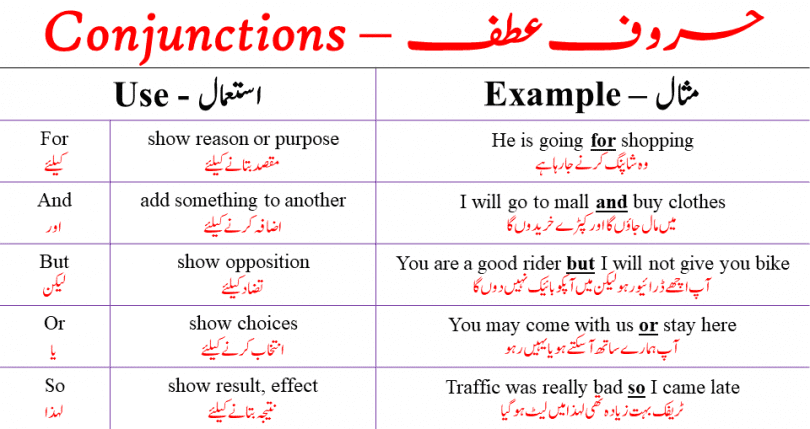
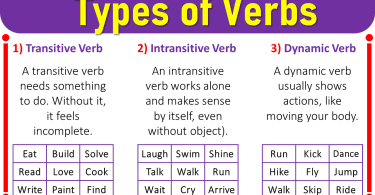
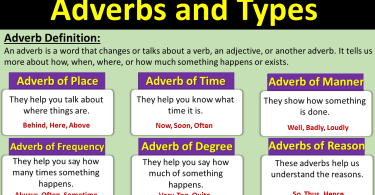
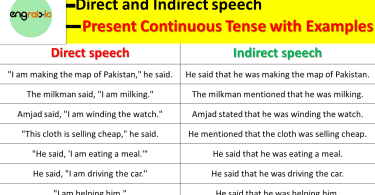
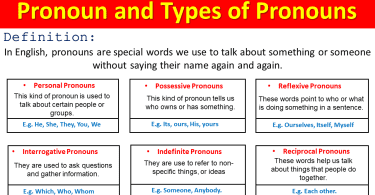
Leave a Comment